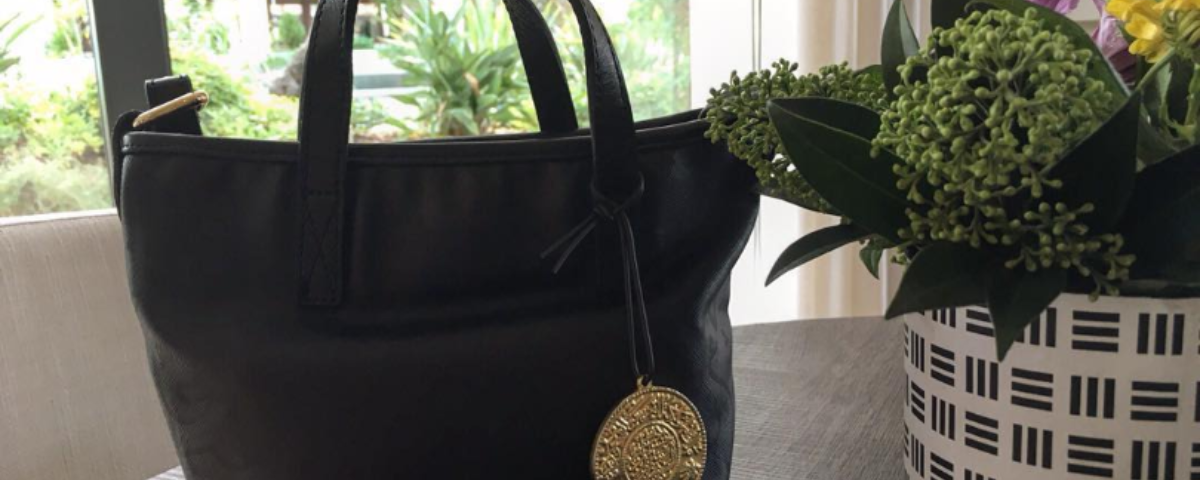





Keep this story going! Share below!
Min Huna is a Saudi-based company that was founded to design and manufacture a collection of bags every year for a different charity of the founders’ choice. Lama and Deema, the founding sisters, try to target little known causes in the Saudi community.
Min Huna is a starting point. The literal meaning is that it “starts from here.” Another meaning to it is because all of their collections had something to do with the Saudi Culture, so Min Huna, is from where they are. “From Saudi to the rest of the world.” -Lama Mansour
Their mission is to shine the light on causes that aren’t well known in their society. A lot of companies have worked with charities that people are well aware of; disabled, special needs. Saudi Arabia already has big corporations to fund these charities. Min Huna wants to give opportunity to smaller charities that need more help. Therefore, they try to target every class of their community. “I want everyone to be a part of Min Huna.”-Deema Mansour

“It’s a funny story,” Lama says, when asked about how the innovation emerged. “We have been raised in a family that has a great deal of background in community service. Growing up in such a surrounding, my sister and I have developed love for such a thing, wanting to always be a part of it somehow.”
Before starting Min Huna, the sisters were merely interested and curious about environmental issues, especially recycling. The learned about a recycling and sustainability company that didn’t have enough funds to print educational books. They decided to create a line of bags to sell, and give back the profit to “Nabta Foundation,” the company, to get them back on the right track.
It was so successful, they decided to take it to another level. They started off by making collections once a year that went to a different cause each time, and then gradually became Min Huna, their first registered social entrepreneurship.
They always try to have a variety of products with prices ranging between 100 and 3000 Saudi Riyals. Lama and Deema are introducing the new concept of “Guilt free shopping” to their community. It’s a win-win situation. You, as a consumer, are buying something you like, as well as giving back for a good cause.
Min Huna has produced 4 collections. Their first collection was the “Street Maps.” The bags had the street maps of Riyadh & Jeddah on them and each consumer could pin point where they lived on the map. Profit from this collection went to printing environmental books to give out to students in schools.
The second collection was for the home health care foundation. The sisters worked with people that live far away from cities that cannot get to hospitals and clinics therefore funding transportation for house call doctors. People tend to forget the fact that Saudi Arabia has remote and run-down areas. Money also went to people who have terminal illness and need weekly doctor checkups but cannot afford it.
The third collection was for art education. “We want to spread art and creativity around Saudi as it is as important. “ Profit from the collection went to collaboration with the Saudi Art Council creating workshops throughout the year, completely free, with lecturers from all over the world, for the Saudi society to enjoy and learn more about the art community.
The next collection went to paying off debts for people who cannot hire a lawyer or afford to bail out their loved ones.
Lama is the creative aspect of this company, in charge of design and drawings, where as Deema is the “Money maker.” Being still a startup, this company has no employees but the two sisters.
They outsource to third parties according to their collection’s needs. “If we need plexi for example, we look for people who work with plexi. We start off by designing the collection. Then move on by sending the designs or prototype to our third party, and then sell the product to consumers.”
With the profit, they then pay the manufacturers for production, give back to the community, and recycle 20% into the company for the next collection.
They try to choose manufacturers that are struggling, so they can keep them up and running. It is quite a simple revenue model. “We started from nothing; we had no money at all. We raised funds to create our first collection, and then started paying manufacturers after we have sold our collections.”
Min Huna has impacted the Saudi community in ways the society has never experienced before. They have targeted:
The future of this company is the upcoming project “Wassmiya.” Wassmiya is actually their late grandmother who inspired their love of giving back. The literal meaning of Wassmiya is an Arabic name that means a “rain cloud full of water symbolizing good.” Because the cause of their upcoming project is water sustainability, the sisters thought the name goes well with the theme. “We will be designing practical praying carpets, and selling them on an online platform. The profit from this upcoming collection will go to build water wells in Africa that will serve up to ninety- thousand people daily, under her name.”
In the long run, Wassmiya will be a sub-division to Min Huna that will include all future projects that have to do with water sustainability.
Min Huna will hopefully be part of the global fashion world in the upcoming years. “We left Saudi Arabia; we entered Africa, and soon expanding to the rest of the world!”
Get stories of positive business innovations from around the world delivered right to your inbox.
Deema Mansour, Owner
